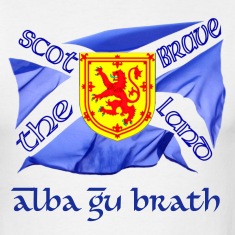
@radiobrendan
It is said that all good things come to those who wait. So after a political union with its fellow British neighbours to the south, England and Wales, since 1707, Scotland may be about to once again go it alone. Well that is ‘go it alone’ insofar as any ‘independent’ country can in today’s globalised world.

Scotland’s First Minister Alex Salmond (centre, kneeling): Set to be the country’s new democratic revolutionary? (Photo from Twitter.)
Of course, whether making a break for autonomy from the UK will be a good thing or not for my Celtic cousins depends on who you speak to. In truth, nobody really knows how such a move would go.
In contrast to many other countries that are currently striving for self-determination and those that did so previously, the Scottish position isn’t exactly a case of running from an oppressive, unrepresentative regime.
In fact, it could be argued that Scotland, on the whole, has benefitted as much as any of the countries in the Union since its inception.
Looking at it with green-tinted eyes, it would be ironic that after countless deaths due to failed uprisings in the name of Irish freedom – followed by protracted violence and death when said freedom wasn’t achieved for some – Scotland gets full independence after a single, democratic act. OK, different time, different context.
For one, in the Irish story you had a majority on the island that were treated and maintained as, at best, second class citizens due to their religion, culture and customs. This was the case throughout the period of English dominance there. In general, the Scots have enjoyed a much fairer deal since their union.
On the flip side, considering all that happened in the last century and the problems still existing regarding Ireland’s ‘national question’, perhaps it should have been the Irish ‘revolutionaries’ who trusted in the ‘all good things’ motto.
In purely economic terms, some say Ireland would have been better staying in the UK. However, there’s more to asserting one’s autonomy than just money matters. At the time of partial Irish secession, there was a general feeling of ‘freedom from a repressive regime’ – we’ll leave the Catholic Church’s unchecked, iron-fisted rule out of this for now. Also, thankfully, that ‘freedom from’ lead to a ‘freedom to’ allow individuals live their lives, speak their mind, state their own political party, etc. (for a greater discussion on this read Thomas L. Friedman’s Order vs. Disorder from The New York Times).
Moreover, after a shaky start, the new Irish state formed alliances, on its own terms, with old friends in Europe. The current financial problems apart, it can be said that the Irish spirit and confidence is stronger today than it was 100 years ago; that’s despite (or maybe because of) our natural begrudgery and cynicism.
As for Scotland’s current run for ‘freedom’, it’s not, to restate, a case of trying to remove the shackles of a repressive regime. It’s a group of largely like-minded people attempting to reassert the full independence of an ancient kingdom.
It’s what you might call benign nationalism, sought after in a democratic way. Should the people give it the green light, it’s highly unlikely ‘new’ Scotland will embark on an expansionist scheme, trying to ‘Tartanise’ the region. Well, there will be a few difficult issues to be needled out – maritime borders and currency to name just two – but they’ll be settled around the negotiating table, not the battlefield.

Scotland — brave or foolish to leave the UK? (Image from spreadshirt.co.uk.)
The point is you only need to look at the Middle East to see the uglier, far more dangerous side to this: aggressive, undemocratic nationalism. Yes, they are a host of intertwined, complex reasons why this is so, with outside influences having as much culpability as those inside.
Much of it emanates from a succession of autocratic leaders followed by weak, quasi-democratic administrations. Legitimacy and order have been sorely lacking. Needless to say the problems there won’t be solved after one or two elections. We’ll leave that discussion for another day.
Back in Scotland, if a yes vote is delivered, it would serve to underscore that this once united, ‘great’ – for it did many great deeds on this planet – Britain is now a fragmented, very ordinary shadow of itself. It would also be, at the very least, a blow to British, nay English, prestige.
In such an event, the door would be open for our Anglo-Saxon and Welsh neighbours to join what you might see as a restructured union, the ‘Alliance of Celts and English’, the ACE group of nations. A potentially powerful hand indeed.
So what’ll it be Scotland?
_______________________________________________________
For a more general piece on the whole area of nationalism and the accompanying problems with it, check out Tribal warfare.
Facebook: Wrong Way Corrigan – The Blog.




Sounds like something Antioquia should do, and once and for all rid ourselves of the ¨centralism shackles¨ that has been unceremoniously imposed upon us by Bogotá.
Califica:
-
Me
gusta
0
- No me
gusta
0
Reportar*have been…
Califica:
-
Me
gusta
0
- No me
gusta
0
ReportarThat sounds like fighting talk Dan! The Paisa Republic of Antioquia, eh?!
Califica:
-
Me
gusta
0
- No me
gusta
0
Reportar